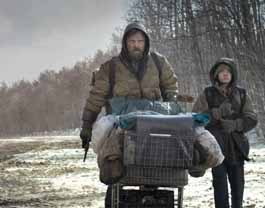home | metro silicon valley index | movies | current reviews | review

BABY IT'S COLD OUTSIDE: Viggo Mortensen's Man and his Boy (Kofi Smit-McPhee) try to survive in the aftermath of a global disaster.
The Trudge Report
Cormac McCarthy's 'The Road' recycles decades of Western-movie manliness
By Richard von Busack
SLOGGING THROUGH the sleet are two figures, half-starved on a perilous road to the sea; they are survivors of some thorough but indefinite holocaust. All civilization has broken down utterly; there is no light, no game—even the deer have given up the ghost—and long-pig consumption is on the rise. The Road is meant to be deep; it's meant to be respected. The film offers a serious vision of a world without warmth, humor or sex, and only a lightweight, one thinks, would flee from it. The Road's postapocalyptic center is a moral struggle: even as his strength wanes, Vigo Mortensen's Man tries pass on the spirit of "the good guys" to his son. The son is called, as in Tarzan movies, "Boy" (Kofi Smit-McPhee).
My problem is that I've seen the same movies novelist Cormac McCarthy saw. The us vs. them aspect is the same as in any video game, or any of the previous dozen movies about zombies or hillbilly ogres. Of course people stay up all night reading The Road—it's the distillation of movies, replete with the kind of incidents where a man being held at gunpoint tells you that you don't have the guts to pull the trigger, and you've got to buck up and kill. Moral seriousness and larger-than-life monsters are part of the Western film canon. The ogres used to have feathers and war paint. The young man being raised to "carry the fire": that's part of Westerns, too. ("Carrying the fire" was in Tommy Lee Jones' dream monologue at the end of No Country for Old Men.) Women need not apply: they're basically two-legged fire extinguishers. As the woman in the picture, "Woman," Charlize Theron is too soft to live in a world without pianos.
There's an argument that you shouldn't critique a conception of a film, only the way it's carried out. The Road has its moments. Mortensen's real-to-the-pith suffering is unimpeachable, and a sightless Robert Duvall's tales of apocalypse have some genuine weight to them. The shambling figures in the mist are all too much like the homeless wraiths we see on sidewalks every day. Yet McCarthy needs an answer when he creates yet another country that's no place for old men. The older person—and I'm one—is always sure that the world is going to decadence and barbarism. The older person is always sure of this because he sees the rot in himself. This is why the older person has to be wary against such solipsism, such fantasies about taking the whole world down in flames with them when they go. So the perfect celebrity voice to read Cormac McCarthy aloud isn't Robert Duvall but Grandpa Abe Simpson: recrimination, lamentation, always biblical lamentation, without a woman's voice to temper the judgment of Jehovah.
Jeff Hillcoat directs; he was previously the architect of that all-u-can-eat buffet of suffering, The Proposition. He and The Road are a cinematic marriage made in hell. The film's heavy product placement for Coca-Cola and Jack Daniels (as if you won't need a double after seeing it) might be considered part of his attempt to lighten up this endless trudge with small, good things. But the gentling of the film doesn't help—and worse, there isn't a moviegoer alive that can take The Road as seriously as it wants to be taken.
![]() THE ROAD (R; 119 min.), directed by Jeff Hillcoat, written by Joe Penhall, based on the novel by Cormac McCarthy, photographed by Javier Aquirresarobe and starring Viggo Mortensen and Charlize Theron, opens Nov. 25.
THE ROAD (R; 119 min.), directed by Jeff Hillcoat, written by Joe Penhall, based on the novel by Cormac McCarthy, photographed by Javier Aquirresarobe and starring Viggo Mortensen and Charlize Theron, opens Nov. 25.
Send a letter to the editor about this story.
|
|
|
|
|
|